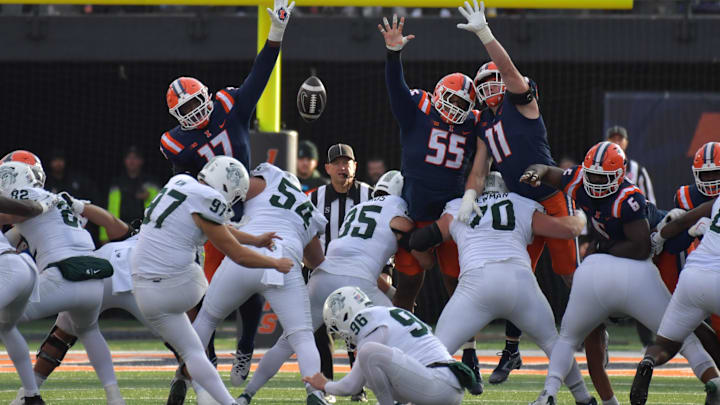For Illinois Football (or Anyone Else), Does Strength of Schedule Matter?

Pick a metric. Any metric.
In college football, as in most modern sports, mathematics is en vogue – even as the meatheads shun the numbers.
So who's right?
Well, if we're looking at the issue through the lens of Illinois football, we might as well dig into strength of schedule – which, admittedly, is a bit of a cherry-pick. SOS metrics can be tallied in a variety of ways, but typically they account for not only opponents' records but also the records of opponents' opponents, as well as, in some cases, the "strength of victory." The results can get dicey and start to feel a little arbitrary pretty fast.
Here's how schedule strength stacks up among the new CFP Top 25 teams 👀
— The Joel Klatt Show: A CFB Pod (@JoelKlattShow) November 20, 2024
Thoughts? 🤔⬇️ pic.twitter.com/DeFmWE9pTx
But at worst, SOS is an interesting thought experiment, and most college football formulas happen to cast the Illini (7-3, 4-3 Big Ten) in a flattering light. ESPN has Illinois at No. 24 in schedule strength, which kind of checks out. The Illini play in a Power 4 conference and have faced five ranked teams – including No. 1 and still-unbeaten Oregon – this season. Penn State's ongoing success and the dramatic recent recovery of Kansas also boost Illinois' SOS.
At the same time, Purdue – which the Illini needed overtime and something approaching divine intervention to beat – is an abomination. Nebraska and Michigan, both ranked when Illinois played them, are in freefall. So, too, is Michigan State. SOS is supposed to take all of these developments into account, but aren't all of these formulas, by nature, undermined by a certain confirmation bias? The Boilermakers (No. 2 in SOS), Spartans (No. 12), Cornhuskers (No. 14) and Wolverines (No. 21), for instance, all play tough schedules. But aren't they also reinforcing the "strength" of opponents simply by losing?
It's a bit of a mind-bender, especially when you start scrutinizing outliers such as Indiana (No. 106) and Notre Dame (No. 85). Are these Hoosier State posers or innocent victims of a funky formula?
The real question is, does any of it really matter? It depends a bit on whom you ask. But if we had to offer a concise answer, it would be "no." The College Football Playoff committee, for example, has its own criteria and system for matching bowl teams, and it doesn't boil down the quality of a program's competition or successes and failures to a number value.
Not that there's anything wrong with it. Even meatheads, as it turns out, like numbers – final scores, poll rankings, career records. It's only human to categorize and compare in order to better understand the world around us. It's why we play games and compete in the first place. But SOS goes only so far in that regard. A decent marker? A dash of context? You bet. If it doesn't demonstrably translate to a more meaningful matchup in a more prominent bowl, though, then it's probably productive toward only two things: bad arguments and bar fights.
